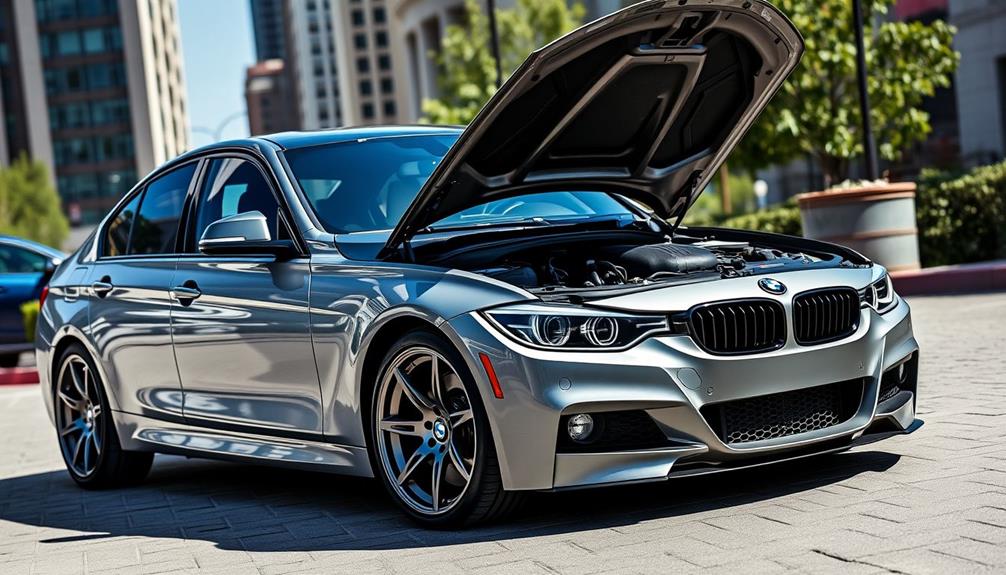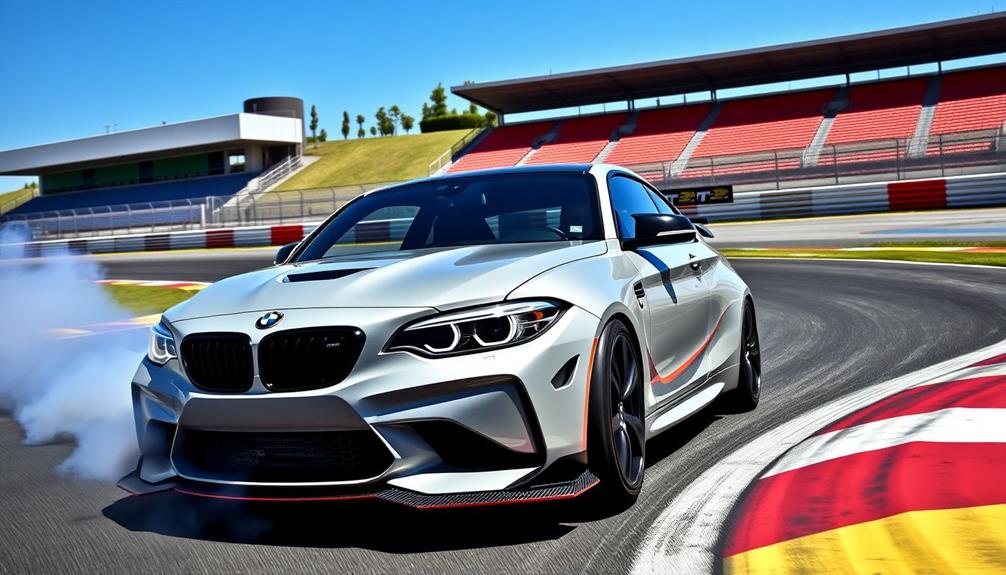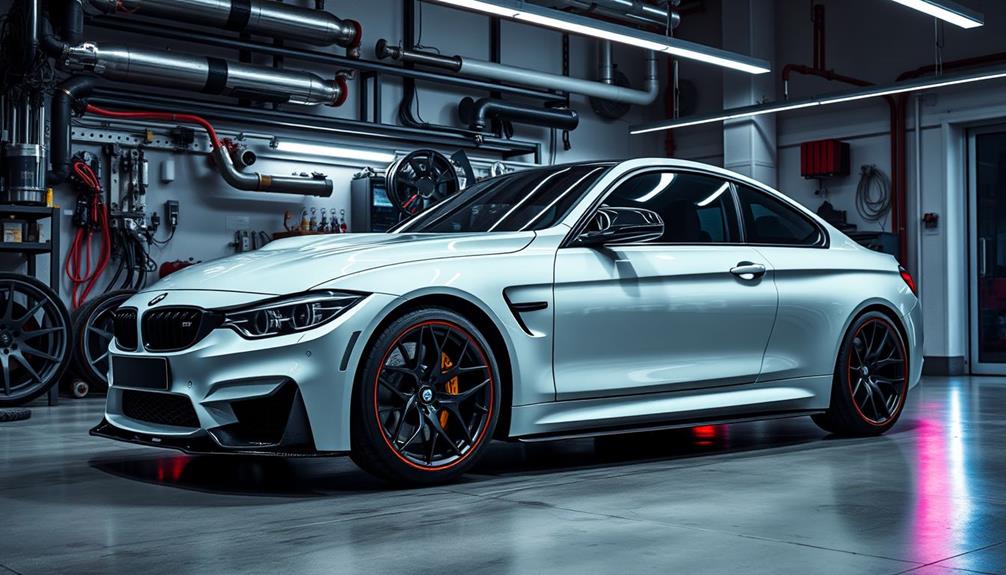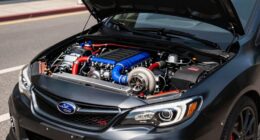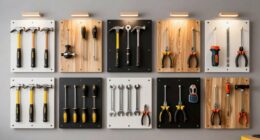Tuning your BMW N20 engine opens up impressive performance improvements for your four-cylinder vehicle. You can start with ECU tuning for increased horsepower and torque, potentially boosting your output to around 286 hp and 325 lb-ft. Adding performance upgrades like intercoolers and downpipes enhances these gains further. Not only will you enjoy a thrilling driving experience, but you may also notice improved fuel efficiency. Just make sure you're mindful of reliability by utilizing high-quality parts and regular maintenance. Want to find out more about optimizing your N20 for maximum performance? Insights ahead will help you get the most out of your tune.
Key Takeaways
- ECU tuning can significantly enhance horsepower and torque, with potential gains of 6% in horsepower and 11% in torque initially.
- Upgrading the intercooler and downpipe during tuning can yield additional power gains, reaching up to 286 hp and 325 lb-ft of torque.
- Improved throttle response and reduced turbo lag result from optimized ignition timing and fuel delivery through ECU tuning.
- Effective cooling solutions, like aftermarket intercoolers, are crucial for maintaining lower intake temperatures and preventing engine knocking during increased boost.
- Regular maintenance, including high-quality oils and spark plug replacements, is essential for reliability after tuning enhancements.
BMW N20 Engine Overview
Since its introduction in 2011, the BMW N20 engine has made a significant impact in the automotive world as a turbocharged inline-four powerhouse. This engine replaced the larger N53 inline-six, offering two variants: the N20B16 (1.6 L) and N20B20 (2.0 L).
The N20B20 variant delivers impressive performance, producing between 154 to 241 HP and torque ranging from 240 to 350 Nm.
Key features of the BMW N20 engine include a twin-scroll turbocharger that enhances power delivery and efficiency, direct fuel injection for peak combustion, and Valvetronic technology that adjusts valve lift for improved responsiveness.
Its lightweight aluminum open-deck engine block further contributes to performance improvements while reducing overall weight.
You'll find the N20 engine in various BMW models, including the 1 Series, 3 Series, Z4, X5, and 5 Series, showcasing its versatility across the lineup.
To guarantee your engine continues to perform at its best, regular maintenance is essential, especially after any tuning.
Using premium fuels and high-quality motor oils will help you maintain the longevity and efficiency of your BMW N20 engine.
Tuning Methods Explained

When it comes to unfastening the full potential of your BMW N20 engine, various tuning methods can help enhance performance and efficiency. The most common method is ECU tuning, which allows for in-depth adjustments to power, torque, and fuel efficiency by modifying the factory engine map. This approach provides fine control over parameters like boost pressure, fuel injection, ignition timing, and valve systems, ensuring ideal power delivery.
On the other hand, piggyback tunes can also increase boost pressure but may compromise reliability since they manipulate sensor outputs without direct control over the engine parameters. While they offer a simpler solution, they're less precise.
The tuning process typically involves remote sessions using tools like an ENET cable and a laptop to connect to your ECU for data reading and performance adjustments.
It's vital to reflect on high intake air temperatures in the N20 engine, as they can affect tuning reliability. Effective intercooler installations become important during performance upgrades, helping to maintain ideal airflow and cooling.
Benefits of Tuning

Tuning your BMW N20 engine can lead to impressive power gains, enhancing both horsepower and torque for a more exhilarating drive.
You'll also notice improved throttle response, making acceleration smoother and more responsive during everyday maneuvers.
Plus, with optimized fuel efficiency, you can enjoy spirited driving while keeping fuel consumption in check.
Enhanced Power Output
One of the most exciting benefits of tuning the BMW N20 engine is the significant boost in power output. By making initial ECU adjustments, you can typically see about a 6% increase in horsepower and an impressive 11% torque gain.
If you're ready to take it a step further with upgrades like an intercooler, those numbers can jump to a remarkable 19% in power and 26% in torque. After tuning, your N20 engine could achieve outputs close to 286 hp and 325 lb-ft of torque, rivaling larger engines like the N55.
Tuning optimizes key engine parameters, such as boost pressure and ignition timing, allowing for tailored adjustments that enhance performance. This not only leads to a more powerful engine but also improves injector performance, which can reduce fuel consumption during everyday driving.
As a result, you'll enjoy a thrilling driving experience with better acceleration and a more responsive engine. Overall, the enhanced power output from tuning transforms your BMW into a more dynamic and enjoyable vehicle, making it a worthwhile investment for any enthusiast.
Improved Throttle Response
The BMW N20 engine's improved throttle response is a game changer for driving enthusiasts. With ECU tuning, you can optimize ignition timing and fuel delivery, resulting in immediate power output when you hit the accelerator. This tuning session fine-tunes the engine maps, reducing turbo lag and ensuring quicker acceleration.
Here's a quick overview of the benefits you can expect:
| Benefit | Description |
|---|---|
| Enhanced Responsiveness | Immediate power delivery enhances driving dynamics. |
| Reduced Turbo Lag | Increased boost pressure leads to quicker throttle response. |
| Smoother Driving Experience | Confident overtaking and merging into traffic becomes easier. |
After tuning, you'll notice a significant reduction in turbo lag, enabling a smoother experience, especially during rapid acceleration. The adjustments elevate the torque curve, allowing your engine to deliver power more consistently across a broader RPM range. This means every time you accelerate, you'll enjoy an exhilarating and engaging drive, making the BMW N20 not just a car, but a thrilling experience.
Increased Fuel Efficiency
Enhancing throttle response isn't just about performance; it can also lead to increased fuel efficiency. When you tune your BMW N20 engine, you optimize injector performance, which can greatly reduce fuel consumption during normal driving conditions.
By adjusting engine parameters like boost pressure and ignition timing, you achieve better combustion efficiency, often translating to improved miles per gallon (MPG) ratings.
Many drivers report a fuel economy increase of about 10-15% after tuning, depending on their driving habits and the specific modifications made. The combination of a tuned ECU and performance upgrades, such as an intercooler, enhances air intake efficiency, further contributing to lower fuel usage.
Moreover, tuning reduces engine load and improves throttle response, facilitating smoother driving. This translates to less effort needed to accelerate, which can lead to reduced fuel consumption in everyday scenarios.
Importance of Performance Upgrades

Performance upgrades play an important role in releasing the full potential of your BMW N20 engine. By investing in performance enhancements like ECU remapping, you can greatly boost horsepower and torque.
For instance, combining an upgraded intercooler with a downpipe replacement can yield power gains of up to 19% in horsepower and 26% in torque. This is critical since optimizing air density directly impacts fuel combustion efficiency, allowing your engine to perform at its best.
Stage 2 tuning is particularly essential; it includes ECU adjustments and additional component upgrades that maximize your N20's performance potential. Quality aftermarket parts play a key role in optimizing boost pressure, fuel injection, and ignition timing, which enhances overall driving dynamics.
Regular performance upgrades not only improve power and responsiveness but also contribute to engine longevity. The N20 engine is prone to high intake air temperatures that can negatively affect reliability.
By addressing these issues with a proper tuning service, you guarantee your engine remains efficient and reliable, giving you the exhilarating driving experience you desire.
To conclude, performance upgrades are important for maintaining the health and capability of your BMW N20.
Cooling Solutions for N20

When tuning your BMW N20, upgrading your intercooler is one of the best ways to improve performance.
You'll find that a well-designed cooling system not only enhances horsepower and torque but also keeps your engine running reliably under higher boost pressures.
Let's explore the different types of cooling systems and their impact on your N20's performance.
Importance of Intercoolers
A properly designed intercooler is essential for maximizing the potential of your BMW N20 engine. By lowering intake air temperatures, an intercooler enhances air density, leading to more efficient fuel combustion. This is especially important when you're pushing your engine with tuning modifications.
Consider the benefits of upgrading your intercooler:
- Prevents engine knocking: A functional intercooler reduces the risk of pre-ignition issues, which can compromise engine reliability.
- Boosts performance potential: Cooler air allows for more aggressive tuning, enabling significant power gains of up to 19% and torque increases of 26%.
- Supports higher boost pressures: An upgraded intercooler is essential for safely increasing boost pressure, particularly during Stage 2 tuning.
When the intake air remains cooler, it mitigates the risks associated with high temperatures that the N20 engine typically faces.
Types of Cooling Systems
While you consider upgrading your BMW N20's performance, understanding the types of cooling systems available is essential for achieving ideal results. One of the most effective solutions is an aftermarket intercooler.
These systems lower intake air temperatures (IAT), which increases air density and enhances fuel combustion efficiency. By keeping IAT in check, you'll reduce the risk of engine knocking and guarantee peak engine performance.
In addition to intercoolers, you might explore other cooling solutions like upgraded radiators and water/methanol injection systems. These options help manage operating temperatures, particularly during high-performance driving.
When paired with ECU tuning, improved cooling systems can yield impressive power gains—up to 19% in horsepower and 26% in torque.
Performance Impact Analysis
Upgrading your BMW N20's cooling system directly impacts its performance. Effective cooling solutions are vital for maximizing power and torque, especially in a turbocharged engine like the N20. By lowering intake air temperatures, you can enhance combustion efficiency and enjoy significant gains in horsepower and torque.
Consider these benefits of improved cooling:
- Power Gains: Expect up to 19% more horsepower and 26% more torque with proper cooling and ECU tuning.
- Engine Longevity: A well-designed cooling system helps maintain lower operating temperatures, extending your engine's life.
- Enhanced Performance: Performance upgrades, such as intercoolers, optimize engine response and provide smoother throttle response.
High intake air temperatures can lead to engine knocking and reduced power output, making cooling solutions essential for maintaining reliability.
With effective upgrades, you're not just pushing for more power; you're ensuring your engine runs safely and efficiently. By keeping those temperatures in check, you can safely explore aggressive tuning options without compromising your N20's safety or performance.
Don't underestimate the importance of a solid cooling system in your tuning journey.
Expected Power Gains

When tuning the BMW N20 engine, you can expect impressive power gains right from the start. With just basic tuning, you might see an initial boost of around 6% in horsepower and an impressive 11% increase in torque. This sets a solid foundation for further enhancements.
If you're keen on maximizing performance figures, consider upgrading your intercooler. This modification can push power gains up to 19%, with torque improvements soaring to approximately 26%. You could achieve outputs of about 286 hp and 325 lb-ft of torque.
For those with the N20B20 variant, ECU tuning can elevate your engine's performance to levels comparable to the N55 engine. While piggyback tuning methods can provide a quick boost by increasing pressure, reliable and sustainable gains come from thorough ECU tuning, which fine-tunes multiple engine parameters.
Maintenance After Tuning

After you've tuned your BMW N20 engine, keeping up with regular maintenance becomes essential to confirm peak performance. Proper care won't only enhance engine health but also prolong the life of your investment. Here are a few key maintenance tips to follow:
- Use high-quality motor oils to guarantee efficient lubrication and reduce wear.
- Replace spark plugs regularly to maintain ideal ignition and power output.
- Monitor operating temperatures closely to prevent overheating.
Adhering to scheduled maintenance intervals is even more critical post-tuning. Your engine now operates under higher stress levels, so consider increasing the frequency of checks on oil, filters, and coolant.
Installing an aftermarket intercooler can also help manage intake air temperatures, further protecting your engine.
Lastly, keep detailed records of all maintenance tasks performed after tuning. This documentation can help identify any emerging issues early and provide valuable insights if any service or warranty concerns arise.
Reliability Considerations

Reliability is a critical factor to evaluate when tuning your BMW N20 engine. While tuning can enhance performance, it is crucial to take into account how these modifications might impact engine reliability. High intake air temperatures during tuning can lead to engine knocking and premature wear if not managed properly. Pay particular attention to the timing chain plastic guides, especially in models made before 2015, as they can deteriorate and break.
Regular maintenance is key post-tuning. Utilize high-quality motor oils and premium gasoline to guarantee your engine components remain in top shape. Additionally, monitor your engine data continuously during the tuning process to prevent damage and enhance longevity. Be aware, though, that tuning might void your drivetrain warranty, as modern ECUs log changes that can be accessed during diagnostics.
Here's a quick reference table to guide your reliability considerations:
| Aspect | Importance | Action Required |
|---|---|---|
| Engine Temperatures | Prevents knocking | Monitor air intake temps |
| Timing Chain Condition | Avoids breakdown | Inspect and replace as needed |
| Oil Quality | Reduces wear | Use high-quality motor oils |
| ECU Monitoring | Prevents damage | Log engine data continuously |
Community Insights and Experiences

Tuning your BMW N20 can lead to impressive power gains, but it's equally important to connect with the community to share insights and experiences. Engaging with fellow enthusiasts can enhance your understanding of various tuning methods and help you achieve peak performance.
- Learn about different ECU tunes and their impacts on power and torque.
- Discover maintenance tips to sustain your performance gains post-tuning.
- Share your experiences with services like Awaken Performance, focusing on driveability and safety.
Many BMW N20 owners report significant power increases after modifications, often reaching around 286 hp and 325 lb-ft of torque. Community discussions emphasize the necessity of regular maintenance and high-quality fuels to keep your engine performing at its best.
Users frequently note that ECU chip tuning generally yields more reliable and customizable results than piggyback tunes.
Additionally, environmental factors, such as fuel quality and air temperature, can greatly influence your tuning outcomes.
Frequently Asked Questions
How Much HP Can You Get Out of a N20?
You can get up to 241 hp from a stock N20 engine. With tuning and upgrades, you could boost that figure to around 286 hp, sometimes even reaching 294 hp with the right modifications.
What Is the Most Powerful N20?
Imagine revving a sleek sports car; the most powerful N20 variant's the N26, delivering 241 horsepower and 350 Nm of torque. With tuning, you can release even more potential for exhilarating performance. It's thrilling!
How Much Horsepower Does the BMW N20 Have?
The BMW N20 engine offers varying horsepower depending on the variant. The N20B16 has 168 hp, while the N20B20 ranges from 154 to 241 hp. Tuning can push these numbers even higher for enhanced performance.
What Is the Performance of the N20b20?
Did you know the N20B20 can produce up to 241 horsepower? Its advanced turbocharger and lightweight design make it a compelling choice. You'll enjoy impressive torque and efficiency, elevating your driving experience considerably.
Conclusion
In the world of BMW N20 tuning, you can transform your four-cylinder engine from a humble performer to a thrilling powerhouse. While the stock setup offers reliability, tuning releases a potential that rivals even the most robust six-cylinders. Yet, with great power comes the need for careful maintenance and cooling solutions. So, as you boost your engine's capabilities, remember to balance performance with reliability—after all, true power is nothing without control. When considering BMW N20 tuning, it’s important to also explore 3 series modifications that can further enhance the overall performance of the vehicle. Upgrading components such as the exhaust system, intake, and ECU can help unleash even more power and torque from the engine. However, it’s crucial to work with reputable tuners and mechanics who understand the intricacies of these modifications to ensure the continued reliability and longevity of your BMW.


